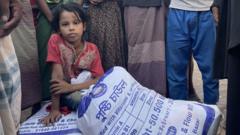In January, 17-year-old Kajol, who supports her family as the sole breadwinner, fell ill with tuberculosis (TB). Until recently, crucial assistance from the US Agency for International Development (USAID) helped manage the disease, which remains a significant threat in impoverished areas of Bangladesh. But that support abruptly ceased when the Trump administration announced deep cuts to USAID funding, endangering countless lives.
In communities like Mohammadpur in Dhaka, where poverty prevails, TB poses a dire public health risk, particularly because treatment can remain out of reach for many. When Kajol first fell ill, she could have faced dire consequences, but local health advocate Dipa Halder stepped up to ensure she received the medical treatment needed for a chance at recovery. Dipa, backed by a local organization named Nari Maitree, had diligently worked over the last three years to provide free testing and treatment for TB in the community.
However, following the termination of USAID funding in February, Kajol's treatment was cut short. Interruption in TB medication heightens the risk of drug-resistant strains developing, making a challenging disease even harder to control. Unable to afford travel to treatment facilities, many patients find themselves unable to continue necessary care.
Reports indicate that USAID's efforts in Bangladesh have resulted in the successful treatment of over a quarter of a million TB cases since 2023 alone. This significant impact on public health is now jeopardized by the reduction in financial support. Asif Saleh, executive director of BRAC, notes that the withdrawal of USAID severely undermines healthcare initiatives across the country.
With the remaining aid budget shrinking to just $71 million for Bangladesh, down from $500 million, vital services like Nari Maitree’s Stop TB Program are being discontinued, jeopardizing livelihoods and health. The ramifications extend beyond immediate health concerns—over half a million jobs tied to the NGO sector within Bangladesh are under threat.
The cutbacks are not limited to US aid. Other nations, including the UK and Switzerland, are also slashing their foreign assistance, signaling a broader retreat from global humanitarian support amid rising national priorities. Despite the rising crisis, interim leader Muhammad Yunus stated that the country will adapt, but specifics on how to navigate the financial challenges remain vague.
In Cox's Bazar, Bangladesh—the world's largest refugee camp—more than one million Rohingya refugees, many of whom fled persecution in Myanmar, are also facing dire conditions due to reduced international assistance. As aid programs like those for sanitation and healthcare grind to a halt, reports indicate increasing instances of cholera and scabies outbreaks. Local organizations struggle to meet urgent needs, even as families like Hamida Begum’s grapple with chronic health issues and insufficient resources.
Rehana Begum illustrates the severity of the crisis, sharing her shocking realization that rations distributed by the World Food Programme would soon be halved. Years of labor and struggle to maintain a semblance of normalcy now teeter under the weight of impending shortages.
Experts warn that the interplay of financial hardship and humanitarian withdrawal brings additional risks to a region already experiencing escalating tensions. The situation is labeled a possible disaster, with humanitarian workers expressing fears for both the stability of the camps and the security of the vulnerable populations residing within them. The urgency of this moment calls for immediate dialogue and a reconsideration of international support to prevent a humanitarian disaster.



















